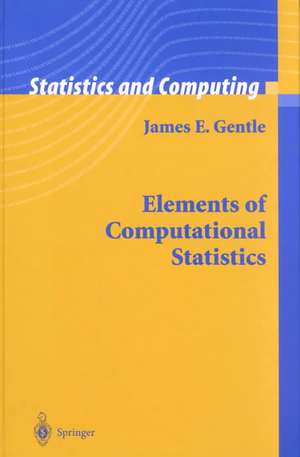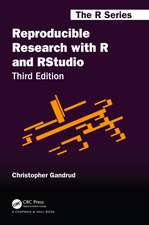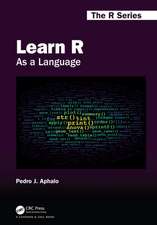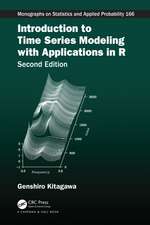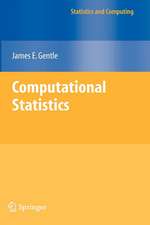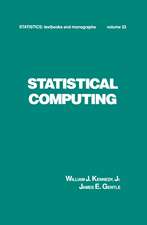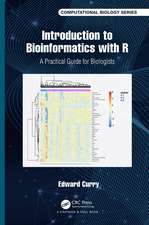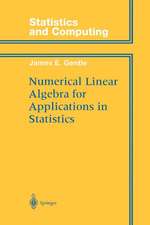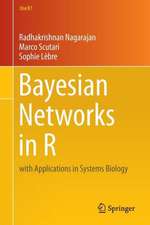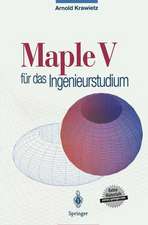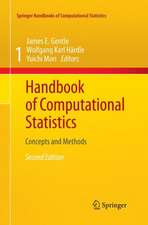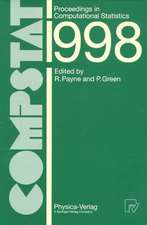Elements of Computational Statistics: Statistics and Computing
Autor James E. Gentleen Limba Engleză Hardback – 12 aug 2002
| Toate formatele și edițiile | Preț | Express |
|---|---|---|
| Paperback (1) | 703.85 lei 6-8 săpt. | |
| Springer – 6 dec 2010 | 703.85 lei 6-8 săpt. | |
| Hardback (1) | 957.62 lei 6-8 săpt. | |
| Springer – 12 aug 2002 | 957.62 lei 6-8 săpt. |
Din seria Statistics and Computing
-
 Preț: 228.21 lei
Preț: 228.21 lei -
 Preț: 438.82 lei
Preț: 438.82 lei -
 Preț: 386.81 lei
Preț: 386.81 lei - 20%
 Preț: 753.97 lei
Preț: 753.97 lei - 20%
 Preț: 1059.77 lei
Preț: 1059.77 lei -
 Preț: 426.72 lei
Preț: 426.72 lei - 20%
 Preț: 474.37 lei
Preț: 474.37 lei - 18%
 Preț: 1387.07 lei
Preț: 1387.07 lei -
 Preț: 433.53 lei
Preț: 433.53 lei -
 Preț: 208.58 lei
Preț: 208.58 lei - 20%
 Preț: 1454.73 lei
Preț: 1454.73 lei -
 Preț: 377.18 lei
Preț: 377.18 lei - 23%
 Preț: 652.30 lei
Preț: 652.30 lei - 20%
 Preț: 1174.26 lei
Preț: 1174.26 lei - 20%
 Preț: 505.19 lei
Preț: 505.19 lei - 18%
 Preț: 959.32 lei
Preț: 959.32 lei - 15%
 Preț: 643.48 lei
Preț: 643.48 lei -
 Preț: 392.75 lei
Preț: 392.75 lei - 15%
 Preț: 640.06 lei
Preț: 640.06 lei -
 Preț: 404.29 lei
Preț: 404.29 lei - 15%
 Preț: 710.42 lei
Preț: 710.42 lei - 15%
 Preț: 695.85 lei
Preț: 695.85 lei - 20%
 Preț: 1276.86 lei
Preț: 1276.86 lei - 18%
 Preț: 1003.38 lei
Preț: 1003.38 lei - 15%
 Preț: 703.85 lei
Preț: 703.85 lei -
 Preț: 384.70 lei
Preț: 384.70 lei - 15%
 Preț: 606.17 lei
Preț: 606.17 lei - 15%
 Preț: 646.94 lei
Preț: 646.94 lei - 15%
 Preț: 589.02 lei
Preț: 589.02 lei - 18%
 Preț: 1117.99 lei
Preț: 1117.99 lei -
 Preț: 503.52 lei
Preț: 503.52 lei - 18%
 Preț: 735.38 lei
Preț: 735.38 lei - 15%
 Preț: 693.90 lei
Preț: 693.90 lei
Preț: 957.62 lei
Preț vechi: 1167.83 lei
-18% Nou
Puncte Express: 1436
Preț estimativ în valută:
183.24€ • 191.83$ • 151.62£
183.24€ • 191.83$ • 151.62£
Carte tipărită la comandă
Livrare economică 05-19 aprilie
Preluare comenzi: 021 569.72.76
Specificații
ISBN-13: 9780387954899
ISBN-10: 0387954899
Pagini: 420
Ilustrații: XVIII, 420 p.
Dimensiuni: 155 x 235 x 33 mm
Greutate: 0.79 kg
Ediția:2002
Editura: Springer
Colecția Springer
Seria Statistics and Computing
Locul publicării:New York, NY, United States
ISBN-10: 0387954899
Pagini: 420
Ilustrații: XVIII, 420 p.
Dimensiuni: 155 x 235 x 33 mm
Greutate: 0.79 kg
Ediția:2002
Editura: Springer
Colecția Springer
Seria Statistics and Computing
Locul publicării:New York, NY, United States
Public țintă
ResearchCuprins
Methods of Computational Statistics.- Preliminaries.- Monte Carlo Methods for Inference.- Randomization and Data Partitioning.- Bootstrap Methods.- Tools for Identification of Structure in Data.- Estimation of Functions.- Graphical Methods in Computational Statistics.- Data Density and Structure.- Estimation of Probability Density Functions Using Parametric Models.- Nonparametric Estimation of Probability Density Functions.- Structure in Data.- Statistical Models of Dependencies.
Recenzii
From the reviews:
TECHNOMETRICS
"For the probable purchasers of this text, I feel that Gentle has succeeded in presenting a broad overview of the major areas of modern computational statistics…In conclusion, I found this book to be a comprehensive summary of computational methods used in modern statistical analyses. It certainly has a place on my bookshelf. The bibliography alone makes it a valuable research tool for those working in this area."
SHORT BOOK REVIEWS
"This book describes many of the exciting, even revolutionary, developments in computational statistics which have been made over the last two or three decades...The book has a rather mainstream statistical feel to it: it gives excellent discussions of topics such as bootstrap methods, density function estimation, and multivariate tools such as principle components, clustering and projection pursuit…It would provide an excellent grounding for someone beginning to work in this area…"
"The book by James Gentle illustrates statistical ideas and computational tools to explore, extract, and test for significance the information in collected data. … The chapters have exercises and solutions. The book is suitable to be a text book in a graduate level course on computational statistics. … I enjoyed reading … and recommend … very highly to the statistical community." (Ramalingam Shanmugam, Journal of Statistical Computation and Simulation, Vol. 75 (2), 2005)
"This book provides a wealth of knowledge on the topic of computational statistics … . Gentle’s prose is very readable, with many sections written in an almost conversational style. … I highly recommend this book as a resource … . I wish to commend Gentle for his efforts on this well-written book. The vast coverage of methodology makes this book a valuable resource for any statistician involved with computational statistics … as well as for applied researchers in other fields who useadvanced statistical methods." (Herbert K. H. Lee, Journal of the American Statistical Association, Vol. 98 (463), September, 2003)
"Computational statistics is a collection of methods and techniques in statistics which are computationally intensive and use the computer as a tool for experimentation. … The material covered is extensive. … relevant references are given. The book also contains lots of exercises of varying level … . The writing style in this book is accessible … . Practical aspects are stressed. All in all, the book is valuable for people who want to know something about the strength and applicability of statistical methods ... ." (Dr. G. Jongbloed, Kwantitatieve Methoden, Issue 72B28, 2004)
"The book is devoted to computationally intensive methods of statistical analysis such as resampling, randomization tests or data mining. … the book covers a lot of questions … . So, this … may be a good reference guide on the current state of statistics. The bibliography contains more than 500 items and there are many WWW references in the text." (R. E. Maiboroda, Zentralblatt MATH, Vol. 1031, 2004)
"Gentle defines computational statistics … as ‘the class of statistical methods characterized by computational intensity and the supporting methods for such methods’. … There is good coverage here of an extensive range of statistical methods … . Each chapter is accompanied by a good selection of challenging exercises … . clear descriptions of the fundamentals together with several references to advanced topics for the interested reader. … I will be happy to use it to dip into as a general reference book." (Richard Bolton, Journal of Applied Statistics, Vol. 31 (9), 2004)
"This book grew out of courses on computational statistics that were offered by the author at George Mason University. … The exercises are an important way of adding to the information that is gained from the text. … The presentationis very accessible. Apart from its obvious use as a course text, this is a useful reference for any statistician who uses or wishes to use computationally intensive methods. This is the third of a series … . I have enjoyed reading all of them." (David Kemp, Journal of the Royal Statistical Society, Vol. 157 (3), 2004)
"This book is an audacious undertaking by the author – an effort to present all of the major statistical methods that require a large degree of computational intensity. … I feel that Gentle has succeeded in presenting a broad overview of the major areas of modern computational statistics. … I found this book to be a comprehensive summary of computational methods used in modern statistical analyses. It certainly has a place on my bookshelf. The bibliography alone makes it a valuable research tool … ." (William J. Owen, Technometrics, Vol. 45 (3), 2003)
"This book describes many of the exciting, even revolutionary, developments in computational statistics which have been made over the last two or three decades. … it gives excellent discussions of topics such as bootstrap methods, density function estimation, and multivariate tools such as principal components, clustering and projection pursuit. … It would provide an excellent grounding for someone beginning to work in this area … ." (D. J. Hand, Short Book Reviews, Vol. 23 (1), 2003)
TECHNOMETRICS
"For the probable purchasers of this text, I feel that Gentle has succeeded in presenting a broad overview of the major areas of modern computational statistics…In conclusion, I found this book to be a comprehensive summary of computational methods used in modern statistical analyses. It certainly has a place on my bookshelf. The bibliography alone makes it a valuable research tool for those working in this area."
SHORT BOOK REVIEWS
"This book describes many of the exciting, even revolutionary, developments in computational statistics which have been made over the last two or three decades...The book has a rather mainstream statistical feel to it: it gives excellent discussions of topics such as bootstrap methods, density function estimation, and multivariate tools such as principle components, clustering and projection pursuit…It would provide an excellent grounding for someone beginning to work in this area…"
"The book by James Gentle illustrates statistical ideas and computational tools to explore, extract, and test for significance the information in collected data. … The chapters have exercises and solutions. The book is suitable to be a text book in a graduate level course on computational statistics. … I enjoyed reading … and recommend … very highly to the statistical community." (Ramalingam Shanmugam, Journal of Statistical Computation and Simulation, Vol. 75 (2), 2005)
"This book provides a wealth of knowledge on the topic of computational statistics … . Gentle’s prose is very readable, with many sections written in an almost conversational style. … I highly recommend this book as a resource … . I wish to commend Gentle for his efforts on this well-written book. The vast coverage of methodology makes this book a valuable resource for any statistician involved with computational statistics … as well as for applied researchers in other fields who useadvanced statistical methods." (Herbert K. H. Lee, Journal of the American Statistical Association, Vol. 98 (463), September, 2003)
"Computational statistics is a collection of methods and techniques in statistics which are computationally intensive and use the computer as a tool for experimentation. … The material covered is extensive. … relevant references are given. The book also contains lots of exercises of varying level … . The writing style in this book is accessible … . Practical aspects are stressed. All in all, the book is valuable for people who want to know something about the strength and applicability of statistical methods ... ." (Dr. G. Jongbloed, Kwantitatieve Methoden, Issue 72B28, 2004)
"The book is devoted to computationally intensive methods of statistical analysis such as resampling, randomization tests or data mining. … the book covers a lot of questions … . So, this … may be a good reference guide on the current state of statistics. The bibliography contains more than 500 items and there are many WWW references in the text." (R. E. Maiboroda, Zentralblatt MATH, Vol. 1031, 2004)
"Gentle defines computational statistics … as ‘the class of statistical methods characterized by computational intensity and the supporting methods for such methods’. … There is good coverage here of an extensive range of statistical methods … . Each chapter is accompanied by a good selection of challenging exercises … . clear descriptions of the fundamentals together with several references to advanced topics for the interested reader. … I will be happy to use it to dip into as a general reference book." (Richard Bolton, Journal of Applied Statistics, Vol. 31 (9), 2004)
"This book grew out of courses on computational statistics that were offered by the author at George Mason University. … The exercises are an important way of adding to the information that is gained from the text. … The presentationis very accessible. Apart from its obvious use as a course text, this is a useful reference for any statistician who uses or wishes to use computationally intensive methods. This is the third of a series … . I have enjoyed reading all of them." (David Kemp, Journal of the Royal Statistical Society, Vol. 157 (3), 2004)
"This book is an audacious undertaking by the author – an effort to present all of the major statistical methods that require a large degree of computational intensity. … I feel that Gentle has succeeded in presenting a broad overview of the major areas of modern computational statistics. … I found this book to be a comprehensive summary of computational methods used in modern statistical analyses. It certainly has a place on my bookshelf. The bibliography alone makes it a valuable research tool … ." (William J. Owen, Technometrics, Vol. 45 (3), 2003)
"This book describes many of the exciting, even revolutionary, developments in computational statistics which have been made over the last two or three decades. … it gives excellent discussions of topics such as bootstrap methods, density function estimation, and multivariate tools such as principal components, clustering and projection pursuit. … It would provide an excellent grounding for someone beginning to work in this area … ." (D. J. Hand, Short Book Reviews, Vol. 23 (1), 2003)
Textul de pe ultima copertă
This book describes techniques used in computational statistics and considers some of the areas of applications, such as density estimation and model building, in which computationally intensive methods are useful. In computational statistics, computation is viewed as an instrument of discovery; the role of the computer is not just to store data, perform computations, and produce graphs and tables, but additionally to suggest to the scientist alternative models and theories. Another characteristic of computational statistics is the computational intensity of the methods; even for datasets of medium size, high performance computers are required to perform the computations. Graphical displays and visualization methods are usually integral features of computational statistics.
Caracteristici
Includes supplementary material: sn.pub/extras
